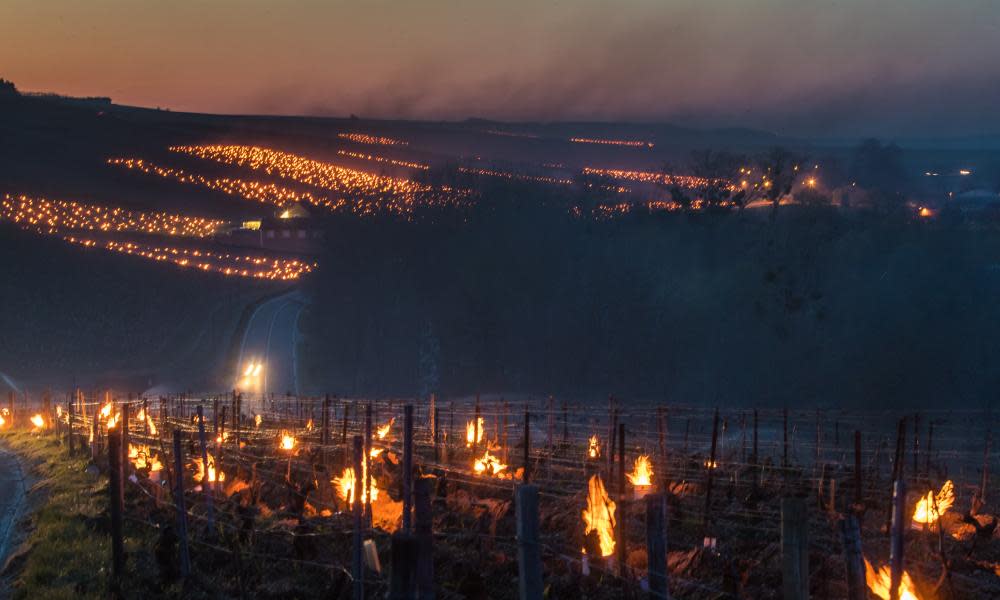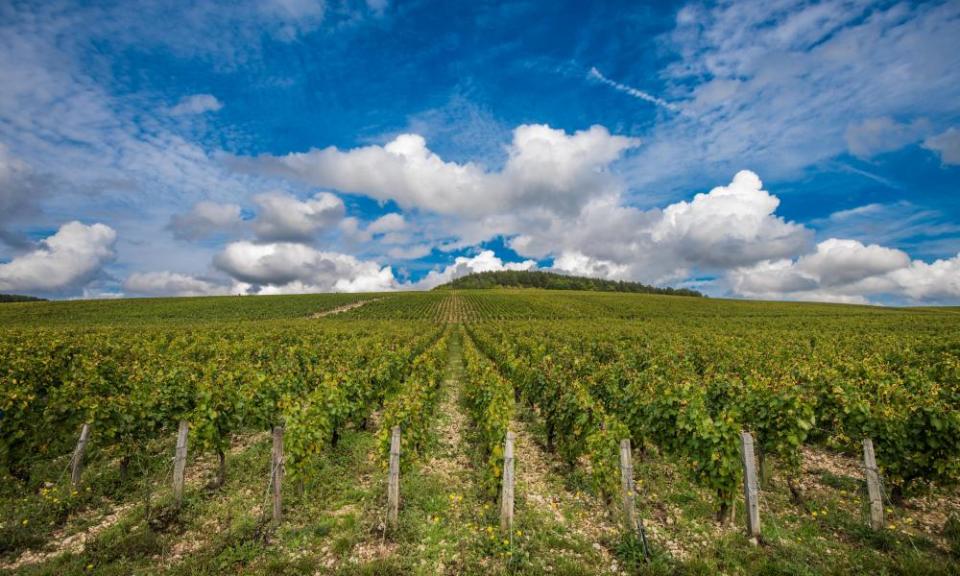Third of French wine lost after rare cold snaps devastate vines

At least a third of French wine production worth almost €2bn (£1.7bn) in sales will be lost this year after rare freezing temperatures devastated many vines and fruit crops across France, raising concerns over the climate crisis.
“This is probably the greatest agricultural catastrophe of the beginning of the 21st century,” the French agriculture minister, Julien Denormandie, said this week as the government declared an “agricultural disaster” and began preparing emergency financial measures.
The unseasonal wave of bitter frost and ice hit suddenly after a bout of warm weather, which worsened the damage. The warmth had encouraged vines and fruit trees to develop earlier than usual, only to be withered by the sudden cold.
The national federation of agricultural holders’ unions told AFP it believes at least a third of French wine production would be lost as certain grape harvests in many of France’s best-known wine-producing regions risked being decimated.
Related: French winemakers count cost of ‘worst frost in decades’
The destruction has hit a swathe of France, including Bordeaux, Burgundy, the Rhône Valley and Provence, damaging vines but also hitting growers of kiwis, apricots, apples and other fruit as well as crops such as beet and rapeseed.
Wine-makers had battled over several nights to try to save vineyards, attempting to heat up fields by lighting thousands of small fires and candles near vines and trees. This created the extraordinary spectacle of the night sky lit by rows of flames between vines.
President Emmanuel Macron tweeted a picture of vineyards lit by candles, expressing support for farmers whom he said were fighting “night after night” to protect crops.
À vous, agriculteurs qui, partout en France, avez lutté sans relâche, nuit après nuit, pour protéger les fruits de votre travail, je veux vous dire notre soutien plein et entier dans ce combat. Tenez bon ! Nous sommes à vos côtés et le resterons. pic.twitter.com/uaW9TmPxYh
— Emmanuel Macron (@EmmanuelMacron) April 10, 2021
Michel-Henri Ratte had set alarms through several nights to light candles to protect his 9 hectares (22 acres) of biodynamic vineyards around Arbois in the Jura, eastern France. But severe frost, followed by snow, devastated the early shoots on the vines.
“We’d bought huge candles – like big paint pots of full of wax –– and we placed them between the vines and ran out to light them at 2am,” he said.
“There were still some green shoots but then the snow came. It was catastrophic. Currently, we’re looking at 100% loss on this year’s harvest. We’ll know in a month if anything has survived. We live close to nature, we’re used to dealing with changing weather, but we were damaged by cold snaps in 2017 and 2019. For it to be happening every two years, and for weather to be going swiftly from very hot to very cold, raises questions about climate change. It wasn’t normal cold, it was a polar cold, much more intense than usual.”

Ratte usually produces up to 30,000 bottles a year but might not produce a single one this year.
He said: “Covid-19 and the lockdown had already left us feeling as if time had stopped and we were in another world. We miss the social interaction, [and] customers coming to our home. During that time, the vines kept going, but now they’ve stopped too.”
Thomas Montagne, the head of the European confederation of independent winegrowers, and a producer in the Luberon, southern France, said: “There’s a sense of disillusionment because French wine producers had already been hit hard by Covid lockdowns and bar and restaurant closures. Independent producers were hit hard by the cancellation of wine fairs due to Covid. International exports have also been affected; we were already hit by the tariffs on French wine imposed by the former US president Donald Trump.”
He said winemakers felt “shock and sadness”.

 Yahoo Movies
Yahoo Movies 
